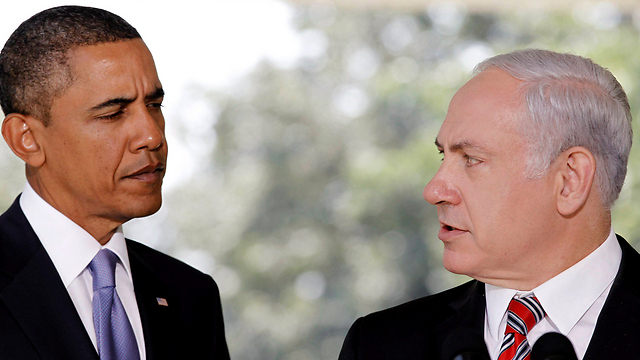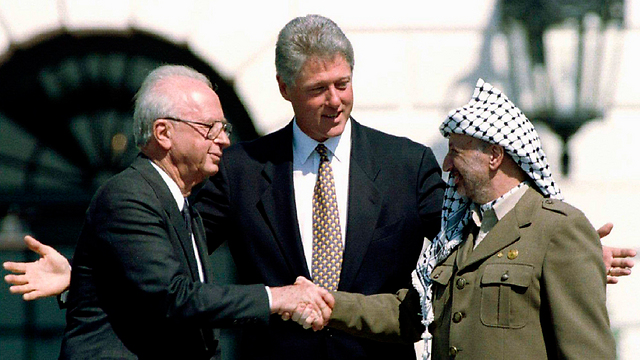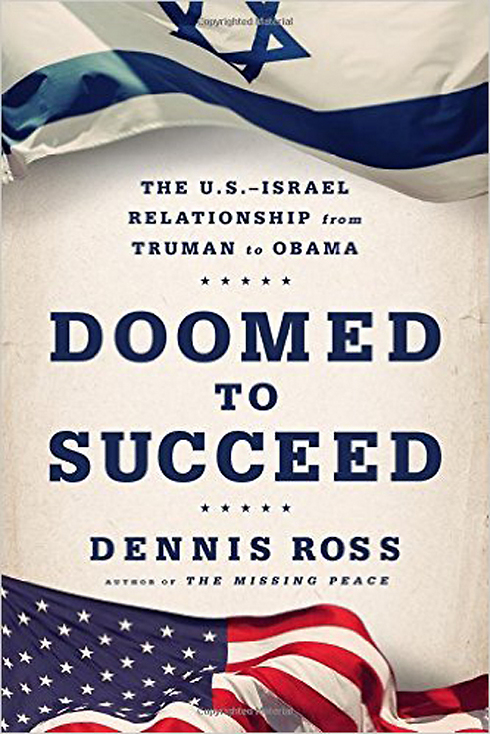

Dennis Ross: Israel-US crisis will be resolved
The veteran diplomat, who has spent more hours with American and Israeli leaders than any other person, talks to Ynet about his new book, which offers an intimate look at US-Israel ties in the past few decades. While Obama and Netanyahu don’t trust each other, he says, the unique relationship between the two countries is 'doomed to succeed.'
They don't trust each other, Ross asserts in an interview to Ynet, but the worst relationship in his opinion belonged to President George H. W. Bush, who thought that Prime Minister Yitzhak Shamir had deceived him, and that was a definite rift. Israel-US relations didn’t reach a low over the Iranian nuclear deal, he says, but over the siege on Beirut and the Sabra and Shatila massacre.
Ross served in Republican and Democratic administrations since the days of President Ronald Reagan, when he served as his Middle East advisor. In the Bush Sr. administration, he was director of the State Department's Policy Planning Staff, which worked on the US policy towards the former Soviet Union, the reunification of Germany, the arms control talks and forming the coalition for the 1991 Gulf War. Bill Clinton put him in charge of the peace team, and Obama used his services as a special advisor on the Middle East and mainly on Iran.
His service has provided him with an intimate outlook on Israel-US relations since the days of President Harry S. Truman to Obama. The result is his new book "Doomed to Succeed," which was published Tuesday. As far as Ross is concerned, there is no other option for the special relationship between the two countries other than success.
Can one president and one prime minister destroy the relations?
Absolutely not, Ross says. After all the affairs, the relations improved. But the key, he believes is that the relations must not be taken for granted. They have to maintained, and both sides are responsible to work on that.
In the administrations Ross has served in, he witnessed battles around the presidents between those who see Israel as a partner and those who see it as a burden. Incumbent National Security Advisor Susan Rice sees Netanyahu as an obstacle to the nuclear agreement and ordered Secretary of State John Kerry not to get him involved in the interim agreement reached with Iran two years ago.
"When people read the book, it's a very straightforward description. Susan in many ways embody the mindset that exists in any administration. The book highlight the fact that if you go from Truman to Obama Administration, there are always those in the national security apparatus that look at Israel in lens of more as a competitor and less as a partner.
"Susan's instincts put her in this camp. At the UN, whenever I asked her she played the right role and that was important, but if you look at the way she operated as a national security advisor v the way Tom Donilon operated as national security advisor, her instincts has been to view the Israelis in more competitive terms and less cooperative terms."
Ross points in his book to misunderstandings and crises which could have been minimized with a different approach, like a calming phone call. "Donilon was very close to President Obama. They both have been. In the administration there are competing instincts and orientations among people. I know it because I saw it, I felt it and I lived it."
He explains that the Reagan administration was the first in which there were people in the American national security's bureaucracy (not individuals like Henry Kissinger during the Nixon and Ford era) who saw Israel as a partner and others who saw it as a burden.
"The supporters see Israel as facing the same threats as us. They see Israel as having capabilities that can add to ours. They see the benefits of intelligence cooperation, military to military cooperation."
Reagan's first two years in office were very difficult. He was the first president to suspend military aid as a penalty, following the bombing of Iraq's Osirak nuclear reactor and after the Israeli law was applied in the Golan Heights in December 1981.
"Since that time you had two competing views. If you go back to Reagan, Secretaries of State Haig and Shultz viewed Israel in more favorable light and Secretary of Defense Weinberger who viewed in a very negative light and during the siege of Beirut wanted us to break relations." According to Ross, that illustrates how radical the views were.
The Bush Sr. administration was often critical of Israel, Ross says, because the president believed Prime Minister Shamir had deceived him on the settlements in their first meeting and he couldn't go over it. The interesting thing is that the Bush Sr. administration got 44 countries to establish or restore relations with Israel, opened the Soviet Union's gates to the Jews and helped with the immigration of Jews from Ethiopia and even Syria, which was an issue Secretary of State James Baker raised in his meeting with Syrian President Hafez al-Assad.
A significant change, Ross notes, took place in the Clinton administration, which was inclined to see Israel as a partner. Clinton thought it would be a mistake to present any dispute with Israel in public. He saw the US as Israel's only real friend in the world and was clearly in favor of improving the relations and cooperating.
President George W. Bush didn’t treat Israel favorably at the beginning of his term, Ross clarifies, but following the September 11 attacks, he began seeing Israel and the US in the same boat in the war on terror.
According to Ross, all presidents tried to avoid dealing with Israel and the Middle East at the beginning of their terms, but the Middle East drew them in. Obama's instinct at the beginning of his term was to stay away from the Israeli issue like the five administrations before him. He felt he has inherited problems with the Arab and Muslim world from Bush Jr. because of the invasion of Iraq, and worked to strengthen the relations. That's why he visited Cairo and the Middle East at first, but not Israel.
Ross writes in his book that the Eisenhower administration did the same and didn’t gain a thing. Richard Nixon, in his first years (until September 1970), consistently tried to get closer to the Arabs, especially to Gamal Abdel Nasser's Egypt. He suspended the supply of Phantom jets to Israel while Russia was building the air defense system and sending military people outside the Eastern bloc for the first time.
Ross notes that Nixon sent Joseph Sisco to Cairo, but that President Nasser couldn’t care less. Nixon, he says, believed that the Six-Day War was American defeat, as it created an opportunity for the Russians in the Middle East.
'Obama saw Israel as the strong side'
And now it's Barack Obama's turn. Ross writes in this book that Obama strengthened Israel's security and didn’t seek to harm it. He saw Israel as the strong side which must be advanced and the Palestinians as the weak side.As a result, Obama relied in the security issue on those who supported Israel. That particularly applies to the Iranian issue, especially in the first term. He wanted Israel to see that the Americans are taking the threat seriously and operated in a way that would not require the US to launch a military operation, by building pressure which had a chance of working.
Ross clarifies that in all the decades he served in Democratic and Republican administrations, he didn't see a major difference between them in the attitude towards Israel. The first administration to take tough steps against the settlements was the Republican Ford administration after Nixon, followed by the Democratic Carter administration, who approached the settlements from a legal aspect. Reagan turned the settlements from a legal issue to a diplomatic issue. Since then, Ross says, all the administrations have been consistent on the settlement issue.

Seven months after Netanyahu's Congress speech behind Obama's back, the two are about to meet for the first time at the White House on November 9. Ross believes that the important thing is not the relationship between the two, but the relationship between the countries, and that he two leaders will try to repair the relations.
According to Ross, while Obama has failed to create contact with the Israeli public, he sees Israel as a country which shares US values and is threatened by the same forces threatening America. Sometimes he sees Israel doing things which he thinks are hurting Israel itself, and he feels compelled to say so.
Ross believes a serious effort will be made during the Obama-Netanyahu meeting to overcome the crisis. He says both sides have an interest to put the differences behind them.
As for the Republican invitation to Netanyahu to address Congress, Ross believes that those who consider themselves as true friends of Israel should not turn it into a political issue. What works today, he explains, won't work tomorrow, as the US is in the midst of a demographic change in which the majority will turn into a minority within 25 to 30 years, following the rise in Asian and Hispanic power.
In light of all the developments, he believes, Israel must maintain is democracy values. In light of the de-legitimization movement, it is particularly important that Israel's policy will match the two-state solution - in other words, building in the settlement blocs and not beyond.
If Dennis Ross were in a position of power in the administration today, he would have suggested in talks with the Israelis to do several things after the current wave of terror were suppressed.
The moment a calm is reached, he says, it's important to ease the conditions on the ground by opening Areas C for Palestinian economic activity. The next stage would be to bring Egypt, Jordan and the Gulf states to the negotiating table with Israel.
Considering the Palestinians' weakness, he says, the Arab states must indicate what they are willing to give Israel in order to get the Palestinians back to the negotiations - public security coordination against shared threats, normal diplomatic and economic relations. They can't do that before Israel makes progress on the Palestinian issue, Ross believes, but the Arabs will have to compromise for the Palestinians, who are incapable of compromising because they feel they are the victim.
Ross says there should be no Netanyahu-Abbas meeting at the moment, as a meeting which is not properly prepared is doomed to fail. He sees no negotiations in the horizon right now, not just because off the atmosphere but because different circumstances have to be created. It can begin, he believes, with an effort to calm the situation down.



















